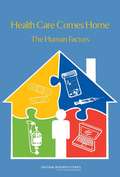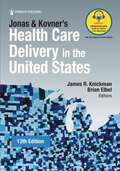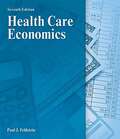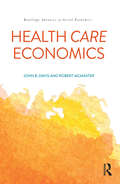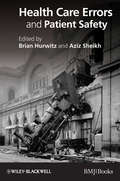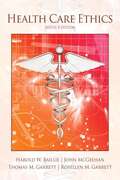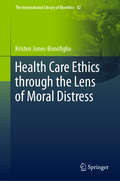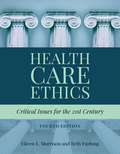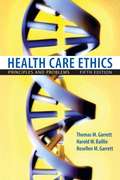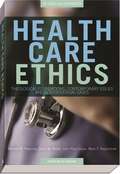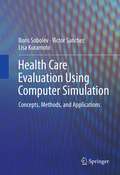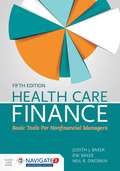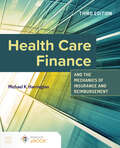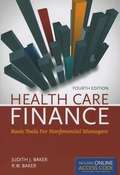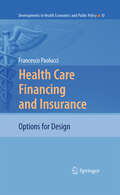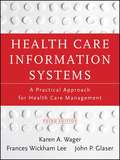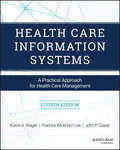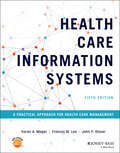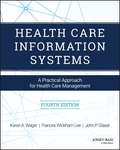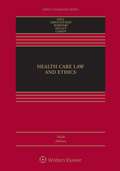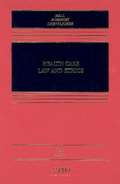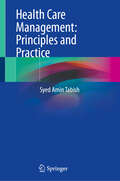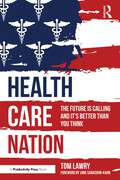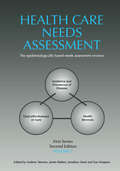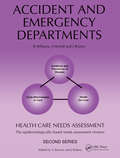- Table View
- List View
Health Care Comes Home
by The National Academy of SciencesThe National Research Council's Committee on the Role of Human Factors in Home Health Care was formed to investigate the role of human factors in home health care and the range of issues resulting from the increased use of medical devices, technologies, and practices in the home. It conducted a workshop on the topic held in October 2009 in Washington, DC, and reports on its conclusions and recommendations here. The report details the relevant people, tasks, technologies, and environments to highlight the most prevalent and serious threats to safety, quality of care, and care recipient and provider well-being. It documents the characteristics of people who give and receive care; human factors tools and methods and their application; tasks and their demands and analysis; technologies used; care factors in physical, social/cultural, community, and policy environments; and 11 recommendations on technologies, residential environments, research and development needs, and other areas, including regulation, adverse event reporting, safety and modification of housing, accessibility and universal design, teamwork and coordination, and assessment. There is no index. Annotation ©2011 Book News, Inc. , Portland, OR (booknews. com)
Health Care Delivery in the United States
by James R. Knickman Brian ElbelThis comprehensive textbook contains information on a wide array of topics, including the organization of care, population health, the fundamental challenges of health disparities, health care financing and economics, and health information technology’s role in improving care and protecting privacy. New chapters on public health preparedness and its role in mitigating effects on health and the health system and the medical and social challenges of caring for older adults provide insight into important, ongoing challenges and what those challenges reflect about our system of care.<p><p> With an increased emphasis on health disparities, population health, and health equity, this textbook includes a timely focus on how social and behavioral determinants influence health outcomes. Students will gain a deeper understanding of public health systems and their societal role and of the economic perspectives that drive health care managers and the system. Thorough coverage of the rapid changes that are reshaping our system, in addition to an evaluation of our nation’s achievement of health care value, will equip students with the critical knowledge they need to enter this dynamic and complex field. The book also includes cutting-edge, evidence-based information on preventive medicine, innovative approaches to control health care costs, initiatives to achieve high-quality and value-based care, and much more from prominent scholars, practitioners, and educators within health care management, public health, population health, health policy, medical care, and nursing.
Health Care Economics
by Paul J. FeldsteinDelivering the most detailed and exhaustive content available, market-leading HEALTH CARE ECONOMICS, 7th Edition demonstrates how basic economic concepts, principles, and theories can be used to think about and illustrate various health care issues. This introductory economics text is geared toward graduate students who will be medical and health services managers, administrators, or executives. The seventh edition of HEALTH CARE ECONOMICS includes recent data on the medical sector, updated figures and tables, the latest information on legislative changes affecting this industry, and new literature and research. It also provides an insightful historical perspective within which these changes are occurring.
Health Care Economics (Routledge Advances in Social Economics)
by John B. Davis Robert McMasterThe analytical approach of standard health economics has so far failed to sufficiently account for the nature of care. This has important ramifications for the analysis and valuation of care, and therefore for the pattern of health and medical care provision. This book sets out an alternative approach, which places care at the center of an economics of health, showing how essential it is that care is appropriately recognized in policy as a means of enhancing the dignity of the individual. Whereas traditional health economics has tended to eschew value issues, this book embraces them, introducing care as a normative element at the center of theoretical analysis. Drawing upon care theory from feminist works, philosophy, nursing and medicine, and political economy, the authors develop a health care economics with a moral basis in health care systems. In providing deeper insights into the nature of care and caring, this book seeks to redress the shortcomings of the standard approach and contribute to the development of a more person-based approach to health and medical care in economics. Health Care Economics will be of interest to researchers and postgraduate students in health economics, heterodox economists, and those interested in health and medical care.
Health Care Errors and Patient Safety
by Brian Hurwitz Aziz SheikhThe detection, reporting, measurement, and minimization of medical errors and harms is now a core requirement in clinical organizations throughout developed societies. This book focuses on this major new area in health care. It explores the nature of medical error, its incidence in different health care settings, and strategies for minimizing errors and their harmful consequences to patients. Written by leading authorities, it discusses the practical issues involved in reducing errors in health care - for the clinician, the health policy adviser, and ethical and legal health professionals.
Health Care Ethics
by Harold Baillie John McGeehan Thomas Garrett Rosellen GarrettHealth Care Ethics is aclear, accessible text/reference that explores the full range of contemporary issues in health care ethics from a practical wisdom approach. The authors present the fundamental concerns of modern medical ethics―-autonomy, beneficence, justice, and confidentiality-―and then provide analysis, cases, and insights from professional literature to discuss them. Throughout, the discussion starts with larger issues or concepts and principles and then focuses on specific problems or complications.
Health Care Ethics through the Lens of Moral Distress (The International Library of Bioethics #82)
by Kristen Jones-BonofiglioThis book provides a bridge between the theory to practice gap in contemporary health care ethics. It explores the messiness of everyday ethical issues and validates the potential impacts on health care professionals as wounded healers who regularly experience close proximity to suffering and pain. This book speaks to why ethics matters on a personal level and how moral distress experiences can be leveraged instead of hidden. The book offers contributions to both scholarship and the profession. Nurses, physicians, social workers, allied health care professionals, as well as academics and students will benefit from this book.
Health Care Ethics: Critical Issues for the 21st Century (Fourth Edition)
by Eileen E. Morrison Beth Furlong<p>Organized around the four central themes of healthcare ethics (theoretical foundations and issues for individuals, organizations, and society), Health Care Ethics, Fourth Edition brings together the insights of a diverse panel of leading experts in the fields of bioethics, long-term care, and health administration, among others. Students will build on this critical platform to develop an extensive toolbox of analytical and problem-solving skills. <p>The fully revised and updated Fourth Edition addresses current changes in health care, including three new chapters covering ethical issues related to Health Information Management, Patient Safety, and Epidemics. All other chapters have been updated to reflect the most recent developments in medical technology and new challenges faced by health care professionals in the era of the ACA.
Health Care Ethics: Principles and Problems (5th edition)
by Thomas M. Garrett Rosellen M. Garrett Harold Baillie John F. McgeehanA revised edition that develops the principles used in American health care ethics and examines the problems of applying these principles to controversial situations. Among the issues discussed are patient autonomy and confidentiality, and new methods of reproduction. This volume addresses not only the ethical problems of health care providers, but addresses the concerns of patients as well.
Health Care Ethics: Theological Foundations, Contemporary Issues, and Controversial Cases
by Michael R. Panicola David M. Belde John Paul Slosar Mark F. RepenshekThis Revised and Expanded Edition addresses complex and controversial health care issues that are very much a part of our everyday lives. Using a normative framework, the authors incorporate specific issues, case studies, and multimedia aides in each chapter to encourage students to engage in moral discourse and reflection. The authors' stimulating faith-based discussion of how particular circumstances in society have an impact on ethical decision making is a significant contribution to our understanding of the complex relationship between health care issues and ethics.
Health Care Evaluation Using Computer Simulation
by Victor Sanchez Boris Sobolev Lisa KuramotoThe purpose of this book is to place computer simulation studies within the paradigm of intervention research that is concerned with comparing the outcomes of health care delivered under different policies. This book presents computer simulation as a tool for testing various policy alternatives that have been developed by decision-makers within health care systems. This approach differs from the use of computer simulation in operations research, where simulation helps determine the configurations of a system that will allow it to function optimally. Although simulation of health care processes is not new, few health care systems have used simulations as a basis for re-engineering the delivery of health services. There is growing appreciation that the complexity of health care processes exceeds the capacity of individual disciplines-health services research, health economics, or operations research-to guide health care reform. In this book, the authors focus on bringing the methodological rigor of evaluative research to the design and analysis of such simulation studies. The book is intended as a reference for health services researchers. It offers a comprehensive description of the methodology of conducting simulation studies in evaluation of service alternatives in surgical care using discrete-event models, including the steps for identifying the clinical and managerial activities of the perioperative process, determining the model requirements, implementing simulation models, designing simulation experiments and analyzing the experimental data, and interpreting and reporting results. The book also offers examples of specific aspects of conducting simulation experiments: how to determine the number of runs needed to estimate the effect of implementing a health care policy; how to allocate the number of runs to study groups in simulation experiments aiming to evaluate policy or management alternatives; and how to use statistical analysis to estimate, interpret, and report effect sizes.
Health Care Finance Basic Tools For Nonfinancial Managers
by Judith J. Baker R. W. Baker Neil R. DworkinHealth Care Finance: Basic Tools for Nonfinancial Managers, Fifth Edition is the most practical financial management text for those who need basic financial management knowledge and a better understanding of healthcare finance in particular. Using actual examples from hospitals, long-term care facilities, and home health agencies, this user-friendly text includes practical information for the nonfinancial manager charged with budgeting.
Health Care Finance and the Mechanics of Insurance and Reimbursement
by Michael K. HarringtonHealth Care Finance and the Mechanics of Insurance and Reimbursement combines financial principles unique to the health care setting with the methods and process for reimbursement (including coding, reimbursement strategies, compliance, financial reporting, case mix index, and external auditing). It explains the revenue cycle, correlating it with regular management functions; and covers reimbursement from the initial point of care through claim submission and reconciliation. Updated throughout the Third Edition offers expanded material on financial statements; new and expanded Skilled Nursing Facility examples; and enhanced sections on PDPM, Practice Management for Primary Care and other Specialties, Clearinghouse Processes, Predictive Modeling (data mining), and more.
Health Care Finance: Basic Tools for Nonfinancial Managers (4th Edition)
by Judith J. Baker R. W. BakerHealth Care Finance: Basic Tools for Nonfinancial Managers is the most practical financial management text for those who need basic financial management knowledge and a better understanding of healthcare finance in particular. Using actual examples from hospitals, long-term care facilities, and home health agencies, this user-friendly text includes practical information for the nonfinancial manager charged with budgeting. <p>The Fourth Edition offers: An expanded chapter on Electronic Records Adoption: Financial Management Tools & Decisions; New chapter : "ICD-10 Adoption and Healthcare Computer Systems"; New chapter: "Other Technology Adoption and Management Decisions"; New chapter: "Strategic Planning and the Healthcare Financial Manager"; New case study: "Strategic Planning in Long-Term Care" that connects with the chapter on strategic planning; New appendix: "Appendix C: Employment Opportunities in Healthcare Finance".
Health Care Financing and Insurance
by Francesco PaolucciAs a contribution to the search for suitable and sustainable solutions to finance rising medical care expenditures, the book proposes a typology of healthcare financing and insurance schemes, based on the dimensions of basic vs. supplementary services and mandatory vs. voluntary coverage, to analyse the design and the complex interactions between various financing and insurance arrangements in several OECD countries. This study provides a better understanding of the strengths and weaknesses of the financial and organisational structures of different countries' healthcare financing and insurance schemes. Its main contributions are the development of a novel and rigorous theoretical framework analysing the economic rationales for the optimal design of healthcare financing and insurance schemes, and an empirical and institutional analysis investigating the consequences for efficiency and affordability of the complex interactions between basic and supplementary sources of financing.
Health Care Information Systems
by John P. Glaser Karen A. Wager Frances W. LeeThe Best Selling Text in the FieldUpdated for the New Era of Health Care IT"This is the most comprehensive and authoritative book available for the field today."--Mark L. Diana, PhD, assistant professor and MHA program director, School of Public Health and Tropical Medicine, Tulane University"With health care information technology now in the national policy spotlight, this book should be required reading for every health care administrator and student." --Mark Leavitt, MD, PhD, chairman, Certification Commission for Healthcare Information Technology"The book provides an excellent overview of foundational principles and practical strategies--a valuable reference for health administration and health informatics students and professionals." --Eta S. Berner, EdD, professor, Department of Health Services Administration, University of Alabama, Birmingham"The authors skillfully provide the tools necessary to facilitate movement from a paper-based to an electronic health record environment while championing the importance of managing in such an environment." -- Melanie S. Brodnik, PhD, director and associate professor, School of Allied Medical Professions, Ohio State University"Deploying health care information technology today is like navigating whitewater in the midst of a raging storm. Leveraging investments while introducing significant change is no easy task. It requires focused attention, a spirit of collaboration, and a willingness to learn from others. This book is written for the IT leader who is willing to tackle these challenges." --Stephanie Reel, CIO and vice provost for Information Technologies, Johns Hopkins University
Health Care Information Systems: A Practical Approach for Health Care Management
by John P. Glaser Karen A. Wager Frances W. LeeBESTSELLING GUIDE, UPDATED WITH A NEW INFORMATION FOR TODAY'S HEALTH CARE ENVIRONMENT Health Care Information Systems is the newest version of the acclaimed text that offers the fundamental knowledge and tools needed to manage information and information resources effectively within a wide variety of health care organizations. It reviews the major environmental forces that shape the national health information landscape and offers guidance on the implementation, evaluation, and management of health care information systems. It also reviews relevant laws, regulations, and standards and explores the most pressing issues pertinent to senior level managers. It covers: Proven strategies for successfully acquiring and implementing health information systems. Efficient methods for assessing the value of a system. Changes in payment reform initiatives. New information on the role of information systems in managing in population health. A wealth of updated case studies of organizations experiencing management-related system challenges.
Health Care Information Systems: A Practical Approach for Health Care Management
by John P. Glaser Karen A. Wager Frances W. LeeThe most up-to-date edition of the gold standard in health care information system references In the newly revised Fifth Edition of Health Care Information Systems, veteran healthcare information management experts and educators Karen A. Wager and Frances Wickham Lee, along with nationally-recognized leader in health information technology, John P. Glaser, deliver a one-stop resource for graduate and upper-level undergraduate students to gain the knowledge and develop the skills they need to manage information and information systems technology in the new healthcare environment. The latest edition sees its focus shift from the adoption of health care information systems and electronic health records to making effective use of health care data, information, and systems and optimizing their impact. New additions to this celebrated text include: Explorations of how health care information systems and information technology can be used to support national quality initiatives, value-based payment, population health management, and precision health and quality reporting Discussions of how issues like interoperability, electronic health record usability, and health IT safety are being (or not being) addressed Treatments of the roles played by data governance and analytics in clinical decision making and healthcare operations. Filled with case studies, supplemental resources, and engaging examinations of critical areas in health care information system use, management, implementation, and support, Health Care Information Systems is an ideal reference for students taking courses in business administration, public health, health administration, medicine, health informatics and health care management.
Health Care Information Systems: A Practical Approach for Health Care Management (Fourth Edition)
by John P. Glaser Karen A. Wager Frances Wickham LeeThe bestselling guide to the field, updated with a new, more relevant perspective Health Care Information Systems is the gold-standard textbook for the field, providing in-depth coverage of real-world health information management.
Health Care Law And Ethics (Aspen Casebook)
by Mark A. Hall Mary Anne Bobinski David Orentlicher I. Glenn Cohen Nicholas BagleyHealth Care Law and Ethics, Ninth Edition offers a relationship-oriented approach to health law—covering the essentials, as well as topical and controversial subjects. The book provides thoughtful and teachable coverage of every aspect of health care law. Current and classic cases build logically from the fundamentals of the patient/provider relationship to the role of government and institutions in health care. The book is adaptable to both survey courses and courses covering portions of the field. Key Features: New authors Nick Bagley and Glenn Cohen Incorporated anticipated changes to the Affordable Care Act More current cases and more streamlined notes, including ones on medical malpractice, bioethics, and on finance and regulation More coverage of “conscientious objection” and “big data” - Discussion of new “value based” methods of physician payment - Expanded coverage of “fraud and abuse” Current issues in public health (e.g., Ebola, Zika) and controversies in reproductive choice (e.g., Hobby Lobby) Coverage of cutting-edge genetic technologies (e.g., gene editing and mitochondrial replacement)
Health Care Management: Principles and Practice
by Syed Amin TabishIn an era of rapid advancements, "Healthcare Management" explores the transformative journey of modern healthcare. This book covers a broad spectrum of topics, from the evolution of healthcare systems around the world and the epidemiological perspectives of healthcare management to the intricate aspects of health policy, planning, and economics. The book examines emerging trends in healthcare needs assessment, public-private partnerships, and evidence-based medicine, offering critical insights into modern management practices. Healthcare reforms are discussed with a focus on professional regulation, law and ethics. Gain insights into the latest scientific discoveries and research methodologies that are pushing the boundaries of what is possible in healthcare. Learn about the collaborative efforts that are accelerating medical breakthroughs and translating research into practice. Anticipate the future of healthcare with expert analyses on the integration of artificial intelligence, personalized medicine, telehealth, medical ethics, health services accreditation, organ transplant and patient-centered care models. "Healthcare Management" is an essential resource for healthcare professionals, administrators, academic administrators, teachers and students who are keen to stay ahead in a rapidly changing field. It provides the knowledge and tools to navigate the complexities of modern healthcare and drive meaningful improvements in patient care and system management, ultimately guiding readers towards establishing world-class healthcare systems and universities.
Health Care Nation: The Future Is Calling and It's Better Than You Think
by Tom LawryWhether a patient, health consumer, physician, nurse, health executive, or elected official, somewhere deep in our brains is this simple truth: the American health system isn’t working, and it will only get worse if we don’t do something about it.Despite spending more money per capita on health care than any other country in the world, the United States struggles to match other nations in life expectancy, health outcomes, and general well‑being. Meanwhile, the system spends more on unnecessary, ineffective, and wasteful services than what we collectively invest in K–12 education in America. All the while, our health status is declining.This is a book about the interconnectedness between the health of people and the health of a nation. It’s about the opportunity and responsibility each of us has to reimagine and reengineer a system that focuses on keeping all citizens healthy and caring for them when they are not.We can and must take back the right we all have to be in better control of things that impact our health and well‑being. This book awakens readers to the possibilities that exist today that are right in front of us if only we choose to see them.This book is for those who want to change American health care from what it is to what they believe it should be.
Health Care Needs Assessment, First Series, Volume 2, Second Edition: The Epidemiologically Based Needs Assessment Reviews, V. 2, First Series
by Jonathan Mant Andrew Stevens James Raftery Sue SimpsonHealth care needs assessment provides information to plan, negotiate and change services for the better, and to improve health in other ways. The first edition of this series established itself as a key source on health care needs for specific conditions supported by the Department of Health. Now in its second edition it provides vital updates taking into account how health care has moved on and how the structure of the UK's health service has changed. Each of the chapters follows the same structure; each analysing its topic, reviewing the incidence and prevalence, the range of services available, and the effectiveness of those services. It describes the central role and aim of health care needs assessment in the NHS health care reforms and explains the 'epidemiological approach' to needs assessment and its effectiveness. Volume 1 includes diabetes mellitus, renal disease, stroke, lower respiratory disease, coronary heart disease, colorectal cancer, cancer of the lung, osteoarthritis affecting the hip and knee, cataract surgery and groin hernia. Volume 2 includes varicose veins and venous ulcers, benign prostatic hyperplasia, severe mental illness, Alzheimer's disease, alcohol misuse, drug misuse, learning disabilities, community child health services and contraception, induced abortion and fertility services. All health professionals, including policy makers and shapers and those assessing quality of service will find this book an essential resource.
Health Care Needs Assessment: The Epidemiologically Based Needs Assessment Review
by Andrew Stevens James RafertyIn the past 10 years spirituality and spiritual care have been much debated in professional healthcare literature, highlighting the need for a recognised definition of spiritual care to enable appropriate assessment of, and response to, spiritual issues. This accessible and highly relevant book surveys the numerous statements, guidelines and standards highlighted by these discussions, and equips healthcare professionals with the knowledge, skills and competence to provide the essence of spiritual care within their professional practice. Practical and evidence-based, this manual proves that delivery of good, professional spiritual care can build on intuitive human skills, and can be taught, learned, assessed and quantified. It gives readers the opportunity to move on from uncertainties about their role in the delivery of spiritual care by allowing them to asses and improve their understanding, skills and clinical practice in this area of care. Spiritual Care for Healthcare Professionals clearly grounds spiritual care in clinical practice. It is highly recommended for supporting academic study and encouraging healthcare practitioners to reflect on their practice and develop skills in spiritual assessment and care. Aimed at all healthcare professionals, it can be used by individual practitioners for continuing professional development as well as by academic staff developing educational programmes.
